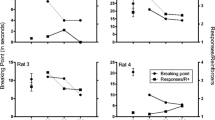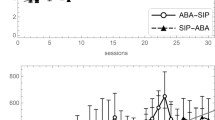Abstract
Schedule-induced polydipsia was studied in 2 food-deprived rats. In one condition one food pellet was presented per “meal,” and effects of varying the inter-meal interval were studied. It was found that as inter-meal interval increased, water intake per session decreased, whereas amount drunk per interval increased, reaching a maximum at 4 min., before decreasing at 5 min. In a second condition rate of food consumption was held constant by increasing meal size as inter-meal interval increased. Despite holding consummatory rate constant, as inter-meal interval increased, the amount drunk per session again decreased. These results are incompatible with the suggestion that schedule-induced polydipsia is a function of consummatory rate.
Similar content being viewed by others
References
FALK, J. L. 1961. Production of polydipsia in normal rats by an intermittent food schedule. Science, 133, 195–196.
FALK, J. L. 1966. Schedule-induced polydipsia as a function of fixed-interval length. Journal of the Experimental Analysis of Behavior, 9, 37–39.
FALK, J. L. 1967. Control of schedule-induced polydipsia: Type, size and spacing of meals. Journal of the Experimental Analysis of Behavior, 10, 199–206.
FALK, J. L. 1969. Conditions producing psychogenic polydipsia in animals. Annals of the New York Academy of Sciences, 157, 569–593.
HAWKINS, T. D., EVERETT, P. B., GITHENS, S. H., & SCHROT, J. F. 1972. Adjunctive drinking: A functional analysis of water and alcohol ingestion. In R. M. Gilbert & J. D. Keehn (Eds.), Schedule effects: Drugs, drinking and aggression. Toronto: University of Toronto Press. Pp. 95–128.
KEEHN, J. D., & COLOTLA, V. A. 1970. Prediction and control of schedule-induced drink durations. Psychonomic Science, 21, 147–148.
KEEHN, J. D., & COLOTLA, V. A. 1971. Stimulus and subject control of schedule-induced drinking. Journal of the Experimental Analysis of Behavior, 16, 257–262.
ROSENBLITH, J. Z. 1970. Polydipsia induced in the rat by a second-order schedule. Journal of the Experimental Analysis of Behavior, 14, 139–144.
Author information
Authors and Affiliations
Additional information
This work was carried out under a Science Research Council studentship. The author wishes to record his grateful thanks to Dr. D. E. Blackman for his support and suggestions throughout the course of the study.
Rights and permissions
About this article
Cite this article
Bond, N. Schedule-Induced Polydipsia as a Function of the Consummatory Rate. Psychol Rec 23, 377–382 (1973). https://doi.org/10.1007/BF03394181
Published:
Issue Date:
DOI: https://doi.org/10.1007/BF03394181




